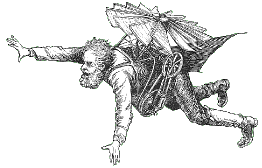| Gothic Steam Phantastic > Information > Point Break |
 Point Break |
 |
| -*- Home -*- Daleth-*- I&I RPG -*- Information -*- Forum -*- Credits -*- Links -*- |
|
In any kind of fiction, there is a point where the fiction leaves reality and enters an alternative world. Clearly, in Lord of the Rings, this is at the very beginning of the novel, because it is set in a different world. In other fiction, like many crime-stories, the setting stays the same and even real-life characters might figure in it - what is different is that some characters are added to reality and the action that takes place has never really happened. In many horror stories, the breaking point of reality and fiction is vague. It’s like a horror-dimension enters our own world, and - this is the scary part - that this horror dimension has always been there and always will be there. Of course, when this turns into a world-wide disaster, the breaking point is right at the point where the horror-dimension takes over. However, in many gothic-horror stories the horror-dimension only enters at a smaller scale and does this many times, leaving normal, real-life society alone to gain some energy for the next breaking point. In Dracula for example, the story is pretty normal. In the beginning, there are some “incidents” that are frightening, but the situation turns to normal soon after. This way, our heroes and victims are only struck by the real horror when it is in fact too late - the real breaking point comes as a major earthquake after some trembling of the earth. After the victory of the heroes, the alternate world goes back to normal. The resulting alternate history was only another shortcut in the real time line, that no-one who hasn’t read the story would have noticed. To create a completely alternative world with an alternate history, a certain breaking point has to be chosen. There are, in my eyes, two ways to create an alternative world:
Back to alternate histories...When setting the breaking point in the far past, there is a lot of history to rewrite, and many resulting facts can be wiped out and make place for new, alternate facts. Doing so, the writer has a lot of possibilities to make the alternate history logic. Yet, the author does have to take care of some resembling points. A reader can cope with strange worlds, but talking alternate history, some grip on known history does have to be there.If we, for example, let Columbus and his colleagues disappear in the Bermuda Triangle, and the America’s wouldn’t have been colonised, there will be no United States as we know it, no New York or Las Vegas, no Hollywood and no MacDonald's. The resulting culture in this alternate history can’t be called an Indian culture, nor a culture of native Americans (both names could never have been given to the people already living there). It will be completely different, maybe influenced by Maya culture, maybe some Sioux, Navajo or Cheyenne culture that goes above and beyond everything we know. It is interesting to write about such a culture, no doubt about that, but in the end it is fantasy like a culture on a random imaginary world. To get a grip on it, it would be easier to follow normal history and adjust facts in a minor way. What if the Indians never were defeated and earned a fortune by building the rail tracks over the American continent, using white slaves? The elements “Indians”, “rail tracks” and “slaves” do ring a bell and provide some grip, even if it’s only alternate history. You can imagine a western story where these elements are put into. But another option, that is used often, is that of a breaking point in the recent past. One significant fact is changed, and this makes an alternate history. Because it happens not that long ago, a lot of things stay the same. For example, in The Difference Engine, the building of this Engine changes bureaucracy and police-work. Steam engines change the horse-races into car-races. And normal life, society in general, still stays the same. That is how it is made believable; there are only minor changes in the setting and the rest stays as we have learned in school. Even well-known historical persons can drop by. But it’s hard to make such a sudden change believable. How fast can a civilisation change it’s ways and turn into an alternate history? Most common in fiction are political changes (including the outcome of a war) or technological innovation. Now, politics might be tricky but easy - many political decisions have either an unknown background for the common reader, or they are decisions that could have made different by the word of only one (wo)man. What if Napoleon never had decided to go to Russia? or what if he did go there and got a warm welcome and was guided to the Russian throne by the Czar himself? To make such alternate decisions believable, it’s only necessary to pick the right event for it, an event that was not wrapped up in logical decisions, and at the same time could have led to radical changes in history, in the way the author wants it. Technological innovation is the other instrument for instant alternate histories. To make a technological invention successful and spread into the world to change history, one has to take care with the following points:
Point Break is in my opinion one of the things a writer should really care about. When Point Break comes too early or too late, some changes become unbelievable. And maybe working with an alternate world including an alternate history that is plausible might be much more difficult than creating an imaginary world with believable inner-logic. © Yaghish 2004 Want to give your opinion on this? |
| -*-© Steammasters 2003-*- |
| ^ Up |